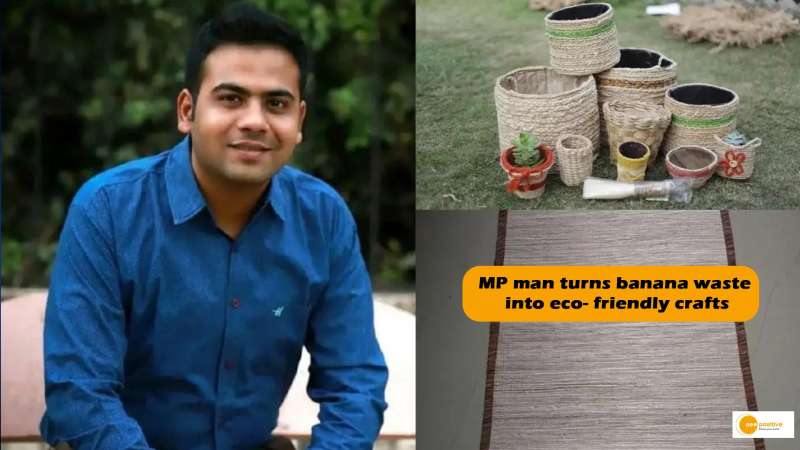

Burhanpur in Madhya Pradesh is a major banana-growing district, with over 16,000 hectares of land dedicated solely to the cultivation of the fruit. Farmers in this area usually hire extra labour to clear the stems and leaves of banana trees from their fields before planting new crops. A large quantity of banana waste is then dumped in pits or elsewhere to rot.
Mehul Shroff, an MBA graduate from the same district, was one of the first to recognise the potential of this alleged waste. He made the decision to turn it into a viable business.
Mehul’s sustainable startup, founded in 2018, creates banana fibre from stems, which can then be turned into useful products such as handicrafts, textiles, and paper. He now sells three to five tonnes of banana fibre per month, with an annual revenue of around Rs 30 lakh.
More than just garbage
Mehul joined his family’s jewellery business after finishing his MBA in 2016. But he had a desire to start his own business. In order to fulfil this dream, he began researching viable and socially responsible business ideas. He met with the District Magistrate of Burhanpur to discuss any idea for a unique business. He also attended a workshop in Burhanpur organised by the district administration and Navsari Agricultural University. He learned how to make fibres from banana stems and how to use them in the textile, paper, and handicraft industries. He spent about two years researching and developing a solid business plan.
Through his research, he came to know that banana stems which is normally considered agri-waste, are rich in cellulose and natural fibre content. As a result, they make an ideal input for producing fibres that can be turned into fabrics.
Mehul founded Shroff Industries, a sustainable business, in 2018. He established a processing unit in Burhanpur and began sourcing banana stems from farmers throughout the district.
Waste transformed into eco-friendly paper and cloths
Mehul’s main challenge was finding a market for banana fibre. Even during marketing, it was difficult to persuade those in the textile industry of the potential of banana fibre. They were hesitant to try something new and organic. So, he gave him the fibres at a low cost, even below the margin. They were convinced once they discovered the outcome was positive.
He eventually moved on to investigate the possibility of making handicrafts out of these fibres. He distributed them to women in Burhanpur’s rural areas to make various handicraft items.
Training the artisans to make handicrafts was another challenge because they were unfamiliar with the raw material. Initially, he assisted them, but now a trainer has been appointed to guide them in making banana fiber-based handicrafts.
Around 40 women who make handicrafts are currently employed. These handicrafts include baskets, planters, ropes, bags, worship brooms, yoga mats, worship mats, wall clocks, and so on. These products range in price from Rs 100 to Rs 2,000, depending on the size and amount of work involved.
Apart from handicrafts, fibres are an excellent alternative for making paper. However, making paper from banana fibre is a time-consuming and labor-intensive process. As a result, he now outsources the processing work by providing the raw materials.
Mehul also have introduced an organic liquid nutrient based on banana waste. Navsari Agricultural University in Burhanpur tested this. Not only does the product contain essential plant nutrients, but it also contains growth regulators and waste-decomposing organisms. It will contribute to increased soil fertility and thus productivity.
Also Read : POSITIVE ACTION: आपकी छोटी-छोटी आदतें हो सकती है पर्यावरण के लिए फायदेमंद!


